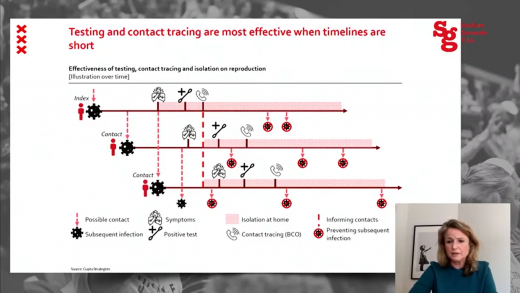12/06/2021
A Studium Generale Lecture with Anja Schreijer
After good consideration of who could be an interesting speaker about the danger of viruses for a Studium Generale lecture, we came up with Anja Schreijer and we could not have made a better choice! Dr. Anja Schreijer, part of the Outbreak Management Team and Head of Infectious Disease Control at the GGD in Amsterdam has given us a very interesting and exceptional lecture about virus outbreaks.
History of infectious disease control
Starting off with telling us about the history of virus outbreaks, she immediately got everyone's attention. Even though it might seem that corona is the most impactful virus of all times, it has definitely not been the only virus we have endured as humanity. Back in the days, health care and hygiene were not as advanced as it is now. When you were sick and had to go into quarantine, chances of coming out alive were not too good. Masks also are not a new thing in this pandemic. During the plague in the old ages, doctors wore this kind of mask to keep away the bad smell.
In the 20th century, there were some big game-changers. First of all, people started with, what we see as, basic hygiene like washing their hands. Next to this, big steps were taken in the field of medicine development. Antibiotics and vaccines were developed and general awareness about infections was created.
Nowadays, we are dealing with very different issues regarding disease control: globalization, climate change, and overpopulation of humans and animals are all reasons for the quicker spread of viruses on a larger scale.
Governance
In 2005, the international health regulation was founded to battle against these challenges on a worldwide scale. All member states promise to detect, assess, report, and respond to infectious diseases as soon as possible.
Besides this, in the Netherlands, we have the Outbreak Management Team (OMT) which gained a lot of fame during the corona pandemic. However, the OMT existed long before the corona pandemic, with its main role to advise the government on containing virus outbreaks.
Basic principles infectious disease control
The difficulty of controlling a virus outbreak lies partly in the incubation time: the time between the moment of infection and the first symptoms. Because of the incubation time, there is a delay in detecting a viral infection. Then there is also a delay between having symptoms and testing, and in this timespan, the infected person could have infected others already. Testing and tracing are very important, especially rapid testing before there has been any contact with other people. Testing also gives great information for identifying clusters and settings of infection. To keep the virus under control, we must keep this timeline short.


Looking back at one year COVID-19 pandemic & Lessons learned
When looking back at one year of the COVID-19 pandemic, what have we learned from it? This was the difficult question asked to Anja Schreijer. However, it was too early to draw any hard conclusions, but a first attempt was made. Starting with mentioning the insufficient IC capacity, test capacity, and source and contact investigators. We were not prepared at all for a virus outbreak this big, since we always thought we could contain a small virus outbreak early enough. To be better prepared for the next pandemic, we should have sufficient resources. But even if we would have had this, another crucial factor is human behavior revolving around the regulations. You can have all the best testing methods of the world, and the best plans, but people need to follow the rules to make it happen.
A big positive development started when we could test everyone because then we started to gain more control over the virus and where it was.
Another lesson to take from this pandemic is the scenario thinking: expect the unexpected. And more importantly, take all scenarios seriously. New variants, a second outbreak after the summer, the more we think out these scenarios, the better prepared we will be the next time. These scenarios should be thought out with experts, policymakers, and decision-makers.
We also noted that international cooperation is of great essence in a global pandemic. Furthermore, self-testing is a great development to make testing even easier.
Questions
Not surprisingly, a lot of the viewers were intrigued by the lecture and asked a lot of very good questions. Anja Schreijer answered the questions about testing, the corona pandemic and the government policy elaborately.
Was the lockdown expected?
No, only on a smaller scale. We always thought we could contain smaller outbreaks. But then it was not a matter if, but a matter of when a pandemic would happen. We should have known better and prepared better.
How do you think we can achieve a better distribution of the vaccinations?
We should really evaluate how vaccines are bought. Some countries buy them for themselves, but what is the role of governments? We should have a good look at how we distribute the vaccines because there are a lot of countries that do not even have access to vaccines.
What are some long term focus points of the OMT?
We have been focusing on the present a lot, because there are great uncertainties right now, for example, about the vaccines if they prevent transmission. In the near future, we will start looking at more long-term plans, because we need to expect the unexpected.
If we would have had rapid tests at the beginning of the pandemic, what would be the impact of this?
It would have made a huge difference. For example in Germany, they had a great testing capacity, which resulted in quicker testing and tracing of the coronavirus. We really have to increase the testing capacity for other viruses to slow down the spread and keep control.
We would like to thank Anja Schreijer for giving this lecture. Many thanks to everyone who has watched the lecture and no worries in case you missed it because the lecture can be watched again through the following link.

Facebook
YouTube
LinkedIn
Instagram